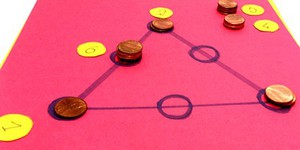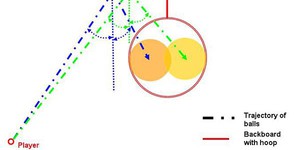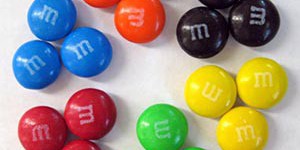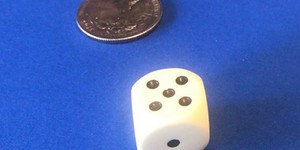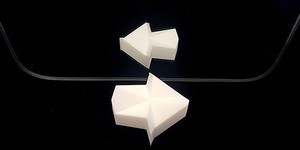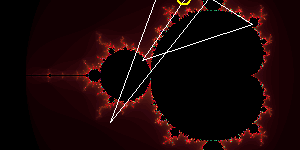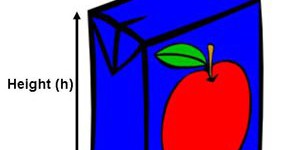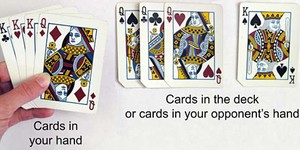Pure Mathematics Science Experiments (55 results)
Fun science experiments to explore everything from kitchen chemistry to DIY mini drones. Easy to set up and perfect for home or school. Browse the collection and see what you want to try first!
Wikipedia defines mathematics as "the study of quantity, structure, space and change." With a definition like that, it's easy to see why math is often called "the language of science." Math is essential for analyzing and communicating scientific results, and for stating scientific theories in a way that is clear, succinct, and testable.
|
Select a resource
Sort by
|
STEM Activity
67 reviews
Do you ever use math as a tool to solve interesting problems? In the 1970s math was often taught with simple worksheets. One teacher developed an exciting way to learn math and logic; he developed what is now known as the perimeter magic triangle puzzles. Try them out—and have some fun as you start thinking about counting in a whole new way!
Read more
If you've ever played or watched basketball, you might already know that your chances of successfully banking a shot on the backboard are higher in certain positions on the basketball court, even when keeping the distance from the hoop the same. Ever wondered what would account for this? Do you think you could actually explain this using geometry? This science project will put your knowledge of geometry and algebra to good use. You will calculate and quantify how much more difficult it is to…
Read more
It has been said that, "Life is like a box of chocolates—you never know what you're going to get" (Forrest Gump in Forrest Gump, 1994). In this science project you can test the "Forrest Gump Chaos Theory" by using M&M's®, which are much cheaper than a box of chocolates. What if life is more like a bag of M&M's? Find out in this science project if some things in life are predictable by using the awesome power of statistics.
Read more
You might think that one sure-fire way to keep your computer safe from hackers is to disconnect it from the internet entirely. But did you know that even without internet, a computer can transmit data using light, sound, vibrations, or even heat? In this project, you will investigate how a spy or hacker can steal data from an "air-gapped" computer that has no internet connection. You can even use a smartphone equipped with a sensor app to demonstrate how the data can be picked up by a nearby…
Read more
STEM Activity
31 reviews
Have you ever heard anyone say the chance of something happening is "50-50"? What does that actually mean? This phrase has something to do with probability. Probability tells you how likely it is that an event will occur. This means that for certain events you can actually calculate how likely it is that they will happen. In this activity, you will do these calculations and then test if your calculations hold true for reality!
Read more
The "impossible arrow" is an amazing optical illusion: an arrow that always seems to point to the right, even when you rotate it 180°. If you place the arrow in front of a mirror, however, its reflection points to the left! How does this illusion work? Can you design your own "impossible" shapes? Try this project and find out!
Read more
Although fractal images can be intriguingly complex, fractals are more than just pretty pictures. In this project, you'll explore the mathematical properties of the famous Mandelbrot (illustration on the Background tab) and Julia sets. You'll learn about how these images are generated, and about the relationship between the Mandelbrot set and the Julia sets.
Read more
Juice boxes are so convenient—just poke the straw in and sip away! But have you ever noticed that some juice boxes don't seem to have much juice, even when they have a lot of packaging? It might surprise you how much thought goes into the design and manufacturing of a juice box. Each manufacturer has carefully calculated how big each side should be to hold a certain amount of juice inside. In this science project, you will find out how different brands of juice measure up.
Read more
No matter what your favorite card game is, we all wish we could use psychic powers to draw the card we want on our turn. You may not have psychic powers, but you might have the power of probability on your side. In this science project, you will discover how math can help you avoid the words, "Go fish!"
Read more
STEM Activity
6 reviews
Did you ever come across a challenge that looked almost too straightforward to try, but turned out to be shockingly tricky, if not impossible? This activity challenges you in a fun way. Something as simple as picking up a piece of candy can be way harder than it looks. Find out why some movements are harder than you’d expect, then trick your friends into trying them. Astonish them with your stunning knowledge of the laws of physics; and most of all, have fun!
Read more
|


